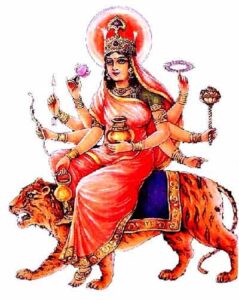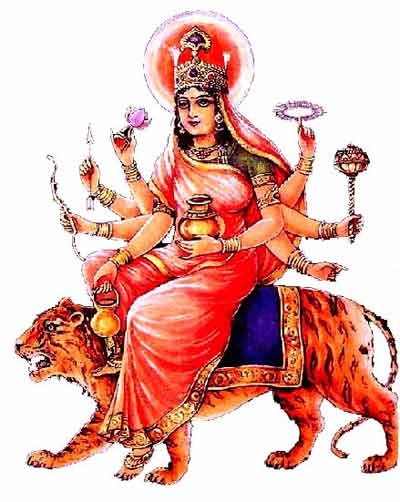
The fourth day of Navarathri is given over to Goddess Kushmanda. It is told that women have seven strengths to the three of man, and on this fourth day of Navarathri, we reflect on woman as gift of intelligence in the home, in the workplace. Goddess Parvati started living inside the center of the Sun so that the sun began to give energy to the universe. Since then Goddess is known as Kushmanda.
Bhagavad Gita 10:34 … Of the qualities that, due to their grace and tenderness, are termed ‘female’, I am fame and fortune, sweet speech, memory, intelligence, steadfast perseverance, loyalty, and forgiveness.
To make up the nine nights, we will add repositories of truth and culture to the list given from the Bhagavad Gita.
Goddess of Day 4: Kushmanda
Kushmanda is the Goddess worshipped on the fourth day of Navratri. The name Kushmanda consists of three words. ‘Ku’ means ‘a little’, ‘Usma’ means ‘energy’ and ‘Anda’ means ‘the cosmic egg or universe.’ She is also known as Ashtabhuja.
After taking form of Siddhidatri, Goddess Parvati started living inside the center of the Sun so that the sun began to give energy to the universe. Since then Goddess is known as Kushmanda. She has the power and capability to live inside the Sun and has the glow and radiance of her body as luminous as that of the Sun. It is believed that Goddess Kushmanda provides direction and energy to the Sun and is popularly known as Ashtabhuja Devi. She bestows siddhis and niddhis that are located in her japa mala.
Goddess Shakti is very happy in her Kushmanda incarnation and it is believed that the eternal darkness ended when she smiled. Her favourite flowers are red coloured flowers and devotees specially offer her hibiscus (or gudhail in Hindi).
Stuti:
Ya Devi Sarvabhuteshu Maa Kushmanda Rupena Samsthita
Namastasyai Namastasyai Namastasyai Namo Namaha
Respect and Women
Have full faith in God as your Indweller. Develop pure sublime love. That alone will be lasting. All other qualities come and go. Learn to live in love. Women are the fountain-source of love. Devotion (bhakti) is considered a feminine quality while wisdom (jnana) is considered masculine. Let me not be misunderstood if I say that for the presence of all the male devotees present here, women alone are responsible. It is they who by their sacred feelings brought their menfolk here. Their work is sacred in every respect. They seek not only to sanctify their lives but the lives of all others in the family.
Women are not to be treated lightly. The Bhagavad Gita says that women are endowed with seven kinds of powers while men have only three. It is sinful to look down upon women.
Consider, for instance, this fact. There are any number of women who have tried to bring back their dead husbands or to venerate their memory. How many men have done likewise for their wives? Many hasten to acquire a second wife. In this respect, Bharat (India) has been an example to the world.
Wherever women are honoured, there is prosperity and happiness. Women should never be slighted or treated with disrespect. A home in which the housewife sheds tears will be bereft of all prosperity. This is the ancient conception of the role of women in the home.

I raise my voice in praise of the Goddess,
remembering the great things she has done:
they are worth reciting.
She is the one from whose fertile womb
everything we see is born
They came out from her, ready to be ordered.
Not only in the old time did she do this wonder,
though:
every day is born from between those miraculous thighs.
Each moment, each event, is continually born from her.
Is this not a miracle?
Is this not worthy of praise?
As continually as you give rise to the world,
Just as continually, I will praise you.
108 Names of the Divine Mother (English)
Om… I bow to SHE who is the Mother of the Universe.
Each of the Divine Names (in English) ends with ~ swaha.
When you use the Sanskrit word swaha you are invoking the God / Goddess, you are arousing the God / Goddess to come and witness your action, to come and receive your prayer.
We append these 108 Names of the Divine Mother and pray that you will be understanding the significance of the prayers, along with the efficacy of same.
Download the 108 Names of the Divine Mother

It is said that each day has a colour, and that idols of the Gods worshipped on these days are clothed in sari and other clothing in the colours given. Several sources give several colours. We will be following the day colours as given by Drik Panchang, which may vary from other sources. It is not our intention to cause offence with colours given.
![]()

